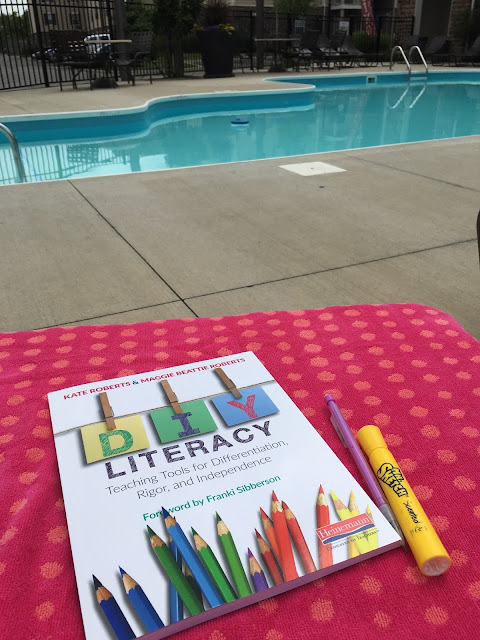Thanks to an amazing teacher that I work with, I was connected to another group of amazing, motivated educators. These teachers and I are participating in a summer #CyberPD, in which we are reading DIY Literacy by Kate Roberts and Maggie Beattie Roberts. Each week we will look closely at a certain portion of the book and share our thinking. Make sure to stop in each week to learn a little more about the book. It may be the next book you need to add to your professional reading list!
This
week, we looked closely at Chapter 1, Chapter 2, and the Bonus Chapter. Of course, I waited until the last minute to
order the book. So when it arrived on Tuesday, I immediately took it to the
pool (my happy place) and started reading!
Immediately,
I knew that this would be an “easy” book for me to read. The authors have written it in such a way that
makes it flow and easy to keep reading through the material.
Chapter
1 focused on the purpose behind what we do as teachers. Our purpose is to
provide learning experiences in which new material is learned in a clear way
and in which is stays with the student to be transferred at a later time. The authors
suggest in Chapter 2, that we do this through four main teaching tools: Repertoire
and Process Charts, Demonstration Notebooks, Micro-Progressions of Skills, and
Bookmarks.
As I read, I reflected on this
information, I thought about how I was currently using these tools and how I
could change my teaching in order to better use these tools to meet the needs
of my students.
·
Repertoire
and Process Charts- As
suggested in the text, I have ALWAYS known that charts are best when they are
made WITH and in front of the students.
HOWEVER, please tell me I’m not the only one, the TYPE A me, steps in
and realizes that I can’t write neatly or design a chart that is as cute, when
I am doing it on the spot. So, what
happens is that I either design a chart ahead of time, with spots to fill in
with the students, I create it entirely by myself, or I make it with the students
and then re-write it later! I love that
the authors said, “They help students get to work and keep working with greater
independence”. They do NOT say that the
chart has to be Pinterest worthy or super cute.
It has to provide students with a resource to enhance their
learning. As I step back into the classroom this fall,
I am going to work on removing my personal desires for the perfect charts, and
remember that the purpose in creating those charts in the first place!
·
Demonstration
Notebooks- These are something
totally new to me. I have used readers,
writers, and math notebooks for years.
However, I have never used a demonstration notebook and I loved reading
about these. This is “ a notebook full
of the lessons and strategies that you know your students need. Each page identifies a need you’ve seen in
your students, offers a clear solution or strategy, an creates space to demonstrate
and work with the strategy in real time with kids”. WOW!
What an amazing tool this would be to have in guided reading. Think about how often you have one reading
group working on a certain skill only to have another group need the exact lesson
a few weeks or months later. This is
definitely on my BTS to do list for this year.
If anyone in the group already does these, I would LOVE to hear more
from you!!
·
Micro-Progression
of Skills- This is a
demonstration or modeling of how students can achieve higher level of skills. I have used some of this with our writing
this year and looking at the If/Then resources from Lucy Calkins. My team created one last year for reading
responses. We noticed that students
wrote quality response only when prompted.
We were trying to get students to realize that they needed to put more
effort into these. We implemented it at
the end of the year and I am hoping to spend more time on them this school year.
·
Bookmarks-The authors suggest that students create
bookmarks to create “grocery lists” or resources or strategies that they know will
help them in their learning. I struggle
with this tool. Often times, I will
create bookmarks for students with strategies that I know I want them to have
at their fingertips. I do this to ensure
everyone has access to the same resources and that they are accurately written
down, etc. I LOVE the idea though, that
students are identifying what they need to become better readers and writers
and then moving forward to help themselves.
I would love to move toward this, as I know it will help to lead my
students to becoming more independent.
What
I loved most about all that I read, was the reference to The Wizard of Oz! “You’ve always had the power, my dear. You had to learn it for yourself”. While, we as educators need to realize how
much we are doing and can do for our students and empower ourselves, we also need to see that they
too, will have to learn it for themselves. The more we empower our students to be
self-starters and engaged in their own learning, the closer we will have gotten
to accomplishing our goals, as well.



No comments:
Post a Comment